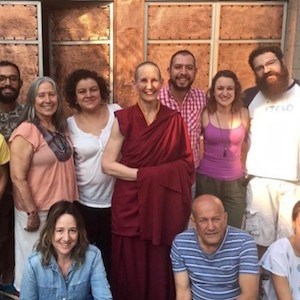Gomchen Lamrim review: Cultivating compassion
Part of a series of teachings on the Gomchen Lamrim by Gomchen Ngawang Drakpa. Visit Gomchen Lamrim Study Guide for a full list of contemplation points for the series.
- The meaning of compassion and bodhicitta
- Review of the nine-point meditation on equalizing self and others
- Explanation of the five decisions
- The benefits of meditating on love and compassion
Gomchen Lamrim review: Cultivating compassion (download)
Contemplation points
- How does seeing yourself as a sick person, afflicted by the three poisons of ignorance, anger, and attachment, help you to understand the source of dukkha in your life?
- Now spend some time thinking about how others are in this very same situation, experiencing this very same illness. Does compassion for them arise in your mind? Does it arise easier for some than for others? If so, why? What obstacles prevent you from having open-hearted compassion for all beings and what can you do to remove those obstacles?
- Consider that compassion isn’t what we do. It’s an internal attitude, although it can motivate behavior. It is the intention, the wish that others be free of suffering and the causes of suffering. Make some examples of the difference between the two. It’s important to have this clear in your mind because if we focus on the idea that we have to physically help every living being (which is just not realistic with our present level of study and practice, our physical limitations), it’s easy to get overwhelmed. Along those same lines, how can you tell the difference between compassion (which is to be cultivated) and personal distress (which is to be abandoned)?
- Consider what it is that we are wishing beings to be free of by looking at all three types of dukkha (dukkha of pain, of change, and the pervasive dukkha of conditioning).
- It can be helpful to think about the benefits of cultivating compassion. Venerable Chonyi listed many of them like our sense of alienation, despair and helplessness vanish, the people around us are happy, we create great merit, our minds will be happy and well. What others can you think of? What does it do for your mind to actively think about the benefits of cultivating compassion?
- Our greatest obstacle to cultivating compassion is our self-centered thought. Spend some time doing a life review. What mistakes have you made in your life? Were your decisions coming from a mind of love and compassion or a mind that saw your own happiness more important than others’ happiness? Although the self-centered thought masquerades as our friend, it is actually the source of all our problems. Do you find this true? Make some examples in your life and really work through your thought process.
- With all the harm we are now seeing in the world, an obvious question is: What can we do to help ourselves, the people around us, and the world? The answer is to cultivate compassion! This benefits everyone. Why is this the case? How can just cultivating compassion in your own mind make a difference in your life? In the lives of those around you? In the world?
The conclusion to each of these contemplations is that seeing the incredible value of compassion, how it transforms our own mind and the lives of those around us, we determine to make the effort to cultivate it in our daily lives.
Venerable Thubten Chonyi
Ven. Thubten Chonyi is a nun in the Tibetan Buddhist tradition. She has studied with Sravasti Abbey founder and abbess Ven. Thubten Chodron since 1996. She lives and trains at the Abbey, where she received novice ordination in 2008. She took full ordination at Fo Guang Shan in Taiwan in 2011. Ven. Chonyi regularly teaches Buddhism and meditation at the Unitarian Universalist Church of Spokane and, occasionally, in other locations as well.


